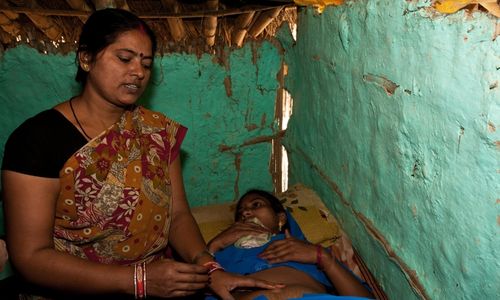Maternal mortality impact on Sundarbans
- February 27, 2023
- Jennifer Moore

“Giving birth should be your greatest achievement, not your greatest fear.”
– Jane Weideman
However, for many women in rural areas, particularly in developing countries like India, giving birth has become a source of fear and anxiety due to the lack of medical facilities and access to skilled healthcare providers. During their visit to the Sundarbans, the PaybitoPro team uncovered a tragic reality – maternal mortality and child deaths.
“The mother-to-be went into labor, but complications arose, and she began to hemorrhage. Despite the frantic efforts of the midwife and her family, she died, leaving behind a grieving husband and three small children.”
– midwife in the Gosaba village, Sundarbans

The Sundarbans, known for its dense mangrove forests, unique wildlife, and vibrant culture are also home to some of the poorest and most vulnerable communities where access to healthcare is severely limited. In recent years, the number of deaths during childbirth has been on the rise in these villages, as expectant mothers are forced to give birth without adequate medical assistance. The lack of basic facilities has turned childbirth into a risky journey for these women, leaving families devastated to cope with the loss.
Also Read: Menstrual Hygiene: Not a ‘Lady’s Problem’!
“A part of me died that day…….”: A Mother After Losing Her Child During Childbirth
Asha Sardar had been eagerly awaiting the arrival of her first child. As her due date approached, she felt a mixture of excitement and apprehension, knowing that she would be giving birth without any medical assistance. The village where she lived had no doctors or hospitals nearby, and the only option was to make the long journey to the nearest hospital, which was 30 km away across the river.
Asha: Who lost her baby during childbirth
“When Asha’s condition worsened, I loaded her onto a boat, hoping to reach the hospital in time. But her condition worsened and she gave birth in the boat. Our baby was turning blue, and having a hard time breathing. Due to low tide, the boat could only go so far, so I carried our baby in a cloth and ran for the hospital. But, by the time we reached the hospital, our son was cold and pale. I didn’t realize he stopped breathing. Asha’s health deteriorated and for weeks she was in a hospital bed. The loss of her child has left a permanent scar.”
-Niloy Sardar (Asha’s husband)
When Asha went into labor, her family knew they had to act quickly. They loaded her onto a boat during low tide and set off across the river, hoping to reach the hospital in time. However, as they made their way across the choppy waters, Asha’s condition suddenly worsened, and she began to experience intense pain and discomfort. Asha was forced to give birth in the boat, attended only by her husband. But the joy of welcoming a new life into the world was short-lived. The baby was born in distress, and despite their frantic efforts to save the child, they lost him before making it to the hospital.
“No one can understand the pain of losing a child during childbirth. It’s like a part of me died that day.” -Asha
Asha was left shattered and heartbroken, grieving the loss of her child and grappling with the pain of giving birth without proper medical care. The memory of that day would haunt her for years to come, as she wondered whether things would have been different if only they had a hospital in their own village.
Also Read: Silent Crisis: Exploring the Alarming Increase in Dropout Rates in Sundarban Schools
Midwife’s Heartbreaking Account of Maternal Mortality and Child Deaths in Sundarbans

In the heart of Sundarban core villages lies a tragedy. It is so heart-wrenching that it brings tears to the eyes of even the strongest of men. During a survey by the PayBitoPro team, they had the misfortune of speaking with a midwife. She shared a sorrowful tale of maternal mortality. How the newborn dies in front of her very eyes, leaving her feeling helpless and alone.
“I followed in my mother’s footsteps as a midwife. Thereafter, it serves the remote islands of Sundarbans where access to basic medical supplies is a luxury. It was after midnight when a woman from a nearby village came running and I was called for a delivery. The mother’s anguished screams could be heard from a distance as she struggled for two grueling hours to bring her baby into the world. Sadly, the baby was stillborn, strangled by an umbilical cord wrapped around its neck. Since the baby was in breach position, the mother was hemorrhaging and passed away soon after. I felt helpless as I could hear the inconsolable father cry his heart out. I have never felt that helpless before, it was heartbreaking.”
The harsh reality of Sundarbans
The midwife’s voice quivered as she recounted the moment she realized that there was nothing she could do to save the mother and her child. The pain and sorrow in her voice were palpable. She describes the scene of the mother struggling to give birth. Moreover, the child’s cries were silenced before they could take their first breath.
It’s a story that speaks to the harsh reality of life in the Sundarbans. It is where access to basic healthcare is a luxury that few can afford. Despite the midwife’s best efforts, the lack of resources made her powerless to save the lives.
Brokering Hope: PayBitoPro’s Initiative to Tackle Maternal Mortality in Sundarbans
The “Brokering World Hunger Away” campaign by PayBitoPro is a vital initiative to address the issue of maternal mortality in Sundarbans. An increasing number of mothers losing their lives due to a lack of proper medical care. This campaign aims to provide better healthcare access. PayBitoPro hopes to bring hope and lasting change to the lives of countless mothers and families in Sundarbans.
“I was in shock to witness firsthand the tragic reality of maternal mortality in Sundarbans. Our new initiative of the ‘Brokering World Hunger Away’ campaign has opened our eyes to the urgent need for better healthcare access for mothers in these remote areas. We cannot ignore the increasing number of mothers losing their lives during childbirth due to a lack of medical facilities. It’s time to take action and provide the care these mothers deserve.”
–Raj Chowdhury CEO of PayBitoPro
It’s a tragedy that highlights the urgent need for better healthcare in this region. Where countless lives lose every year due to preventable illnesses and complications. It’s a call to action for governments and organizations to invest in the healthcare infrastructure of the Sundarbans. Thereafter, ensure that tragedies like this never happen again.
Categories
- AI (9)
- Altcoins (10)
- Banking (10)
- Bitcoin (133)
- Bitcoin ETF (11)
- Bitcoin Price (30)
- Blockchain (49)
- Brokering World Hunger Away (16)
- Business (9)
- CBDC (11)
- COVID-19 (3)
- Crypto ATMs (1)
- Crypto Banking (17)
- Crypto Bill (1)
- Crypto business owner platform (31)
- Crypto Investment (3)
- Crypto Markets (5)
- Crypto Payment (29)
- Crypto Prices (1)
- Crypto Trading (92)
- Cryptocurrency (401)
- Cryptocurrency Exchange (108)
- Data Visualization (2)
- Decentralized Finance (7)
- DeFi Payment (9)
- DEX (3)
- Digital Currency (22)
- Ethereum (2)
- FAQ (6)
- Finance (24)
- Financial Equality (4)
- Financial Freedom (8)
- Forex (24)
- ICO (2)
- Investment (11)
- Mining (3)
- News (66)
- NFTs (2)
- P2P (1)
- PayBitoPro (692)
- PayBitoPro Coin Listing (6)
- PayBitoPro Exchange (2)
- Post COVID Digital Transformation (1)
- Press Release (130)
- Privacy & Security (3)
- Real Estate (1)
- Stablecoin (4)
- Technology (14)
- Uncategorized (3)
- US Presidential Election (2)
- Utility Coin (1)
- Web3 business (3)
- Web3 Wallets (2)
- White Label Crypto Exchange (6)
Recent Posts
- Why Blockchain Education Is Key for Web3 Adoption
- Web3 Business Marketing: Building Community and Brand for Your Crypto Venture
- Why Blockchain Awareness Is Critical Before You Dive Into Web3
- Why Market Research Is the Foundation of Every Successful Web3 Business
- Start A Web3 Business: A Step-by-Step Web3 Startup Guide for Entrepreneurs





